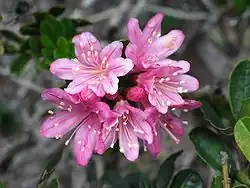Bejaria
| Bejaria | |
|---|---|

| |
| Bejaria imthurnii | |
| Scientific classification | |
| Kingdom: | Plantae |
| Clade: | Tracheophytes |
| Clade: | Angiosperms |
| Clade: | Eudicots |
| Clade: | Asterids |
| Order: | Ericales |
| Family: | Ericaceae |
| Genus: | Mutis (1771), nom. cons. |
| Synonyms[1] | |
| |
Bejaria is a genus of flowering plants belonging to the family Ericaceae.[1]
Its native range is the tropical and subtropical Americas, from the southeastern United States and Mexico to Bolivia and northern Brazil.[1]
Species
15 species are accepted.[1]
- Bejaria aestuans Mutis
- Bejaria cubensis Griseb.
- Bejaria imthurnii N.E.Br.
- Bejaria infundibula Clemants
- Bejaria ledifolia Bonpl.
- Bejaria mathewsii Fielding & Gardner
- Bejaria nana A.C.Sm. & Ewan
- Bejaria neblinensis Maguire, Steyerm. & Luteyn
- Bejaria racemosa Vent.
- Bejaria resinosa Mutis ex L.f.
- Bejaria sprucei Meisn.
- Bejaria steyermarkii A.C.Sm.
- Bejaria subsessilis Benth.
- Bejaria tachirensis A.C.Sm.
- Bejaria zamorae S.E.Clemants
References
- ^ a b c d "Bejaria Mutis | Plants of the World Online | Kew Science". Plants of the World Online. Retrieved 22 August 2024.